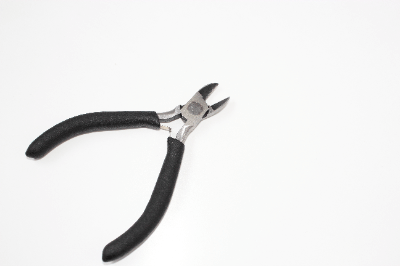What Are Nippers?
 Nippers are cutting tools similar in shape to scissors. They have sharp blades and are used to cut wires and wiring.
Nippers are cutting tools similar in shape to scissors. They have sharp blades and are used to cut wires and wiring.
Nippers are commonly used as cutting tools, so they are often used at home as well as in wiring work. They are suitable for detailed work because they can cut precise locations.
There are various types of blade tip shapes and materials, each of which has different cutting ability, cross-section of the cut, suitable materials for cutting, and suitable situations, etc. Therefore, it is important to select the right one for the intended use.
When using nippers, there is a risk of splattering of cut pieces. It is advisable to wear safety glasses.
Uses of Nippers
Nippers are mainly used for cutting metal wire. However, there are a wide variety of uses for nippers, as there are many different objects to be cut.
Nippers specialized for cutting other than metal include plastic nippers used for cutting plastic models that make it difficult for masking tape glue to stick to the blade.
Nippers are small and lightweight, and are often kept in ordinary homes. Besides home DIY and handmade products, they are also used for electrical work and repair of electrical products.
Since there is a wide range of amounts depending on the product, it is important to use the right one for the right purpose.
Principle of Nippers
Nippers are constructed by successfully utilizing the principle of leverage to achieve a high level of cutting ability. When comparing the shapes of nippers and scissors, the major difference between the two is the length of the cutting edge.
Comparing the lengths of the center axis of rotation and the cutting edge of scissors and nippers, respectively, the nipper is extremely shorter than the scissors. Applying the principle of leverage, the fulcrum is the center axis of rotation of the Nipper, the force point is the grip part, and the action point is the blade of the Nipper.
The closer the central axis of rotation of the Nipper is to the cutting edge, the closer the starting point is, and the longer the grip handle is, the more force can be applied to the cutting process, so it is easier to cut with less force.
This is the reason why it is easier to cut thick objects with scissors near the center axis of rotation, which is the fulcrum, i.e., at the root of the blade.
How to Choose Nippers
When choosing nippers, consider the following three points:
1. The Right Type of Nippers for the Item to Be Cut
Nippers are available in various types depending on the thickness and material of the item to be cut. Typical nippers are as follows:
Strong Nippers
Strong nippers are suitable for cutting hard materials such as wire and electric cable. Since the emphasis is on cutting strength rather than smoothness of the cutting surface, the cutting surface is sharp but also has the characteristic of being mountainous in shape.
Electrician’s Nippers
Electrician’s Nippers are mainly used for cutting wiring and can easily cut hard wires. Some electrician’s nippers are specially designed for wiring work and are equipped with a function to remove wiring sheathing, making them suitable for wiring work.
2. Blade Shape
There are two types of nipper blades: single-edged and double-edged. Double-edged blades are suitable for cutting hard materials, while single-edged blades are suitable for cutting soft materials.
3. Blade Angle
There are two types of single-edged nippers: straight blades and round blades. The round blade focuses on sharpness, whereas the straight blade is designed to make the cutting surface as flat as possible.
In both cases, the steeper the blade angle, the better the cutting performance, but care must be taken because the cutting surface becomes rougher and the blade strength decreases.
Types of Nippers
As mentioned above, there are various types of nippers. In addition to strong nippers and electric nippers, the following are typical nippers:
-
Heat nippers
- Diagonal Nippers
- Precision Nippers
- Plastic Nippers
- End nippers
- Micro Nippers